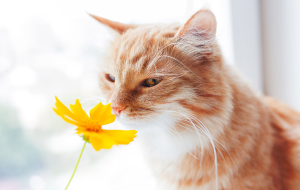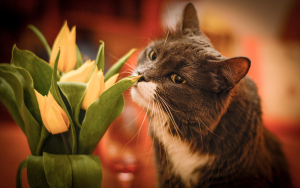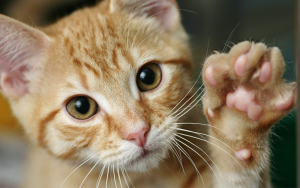Why Do Cats Chirp? Understanding the Fascinating Behavior of Cats

Cats are mysterious creatures with complex behaviors that often leave us wondering about their intentions and emotions. One such behavior that has captured the curiosity of many cat owners and animal lovers is the chirping or chattering sound that cats
sometimes make. But what does it mean when your cat chirps? Is it a form of communication, a sign of excitement, or something else entirely?
In this comprehensive article, we will explore the reasons behind why cats chirp, the different types of chirping sounds they make, and what you can do as a cat owner to better understand your feline friend. Whether you’ve noticed your cat making this
sound frequently or have never heard it before, this guide will provide insights into this intriguing behavior.
Table of Contents:
- What Is Cat Chirping?
- Common Reasons Cats Chirp
- 2.1. Communication with Humans
- 2.2. Hunting and Prey Drive
- 2.3. Excitement and Curiosity
- 2.4. Stress or Anxiety
- Types of Chirps and What They Mean
- How Do Cats Chirp?
- Is Chirping the Same as Meowing?
- What to Do If Your Cat Chirps Excessively
- When to Worry About Your Cat’s Chirping
- Conclusion
1. What Is Cat Chirping?
Chirping, also referred to as “chattering,” is a distinct sound that many cats make, characterized by short, rapid bursts of noise that can sound similar to a bird’s call or a soft “mew” with a slightly higher pitch. The sound often resembles a mix between
a meow and a purr, with rapid, staccato notes that are sometimes accompanied by twitching or flicking of the tail.
This behavior is typically observed when a cat is focused on something, such as a bird or another animal outside the window. It’s common for cats to make this noise while watching birds, squirrels, or other potential prey, and it often occurs when they
are “stalking” or showing interest in something.
2. Common Reasons Cats Chirp
Cats chirp for various reasons, and it’s important to understand the context and situation surrounding the chirping. Below are the most common reasons why cats make this intriguing sound.
2.1. Communication with Humans
One of the primary reasons cats chirp is to communicate with their human companions. While cats are known for being more independent than dogs, they still develop strong bonds with their owners and use a variety of vocalizations to convey their feelings.
Chirping is one such way to interact.
Your cat may chirp at you to get your attention, ask for something, or simply express excitement. For example, if your cat is chirping as it follows you around the house, it could be asking you to play or indicating that they want you to engage with them
in some way.
2.2. Hunting and Prey Drive
Cats are natural hunters, and chirping often occurs when a cat is watching potential prey. This behavior is deeply rooted in their instincts, even if they no longer need to hunt for food.
When a cat sees a bird, squirrel, or even an insect, it may chirp in response to the excitement or frustration of not being able to catch the prey. The chirping could be a signal of the cat’s anticipation, as if they are trying to communicate their intent
to hunt or signal a desire to catch the animal.
This behavior is common when cats are observing wildlife from inside the house, such as through a window. It’s especially prevalent when the prey is within sight but just out of reach.
2.3. Excitement and Curiosity
Cats are naturally curious creatures, and chirping can be a sign of their excitement or curiosity about something new in their environment. Whether it’s a new toy, an unfamiliar object, or a sudden noise, your cat might chirp to express their curiosity.
This type of chirping is typically accompanied by behaviors such as jumping, crouching, or pacing. It’s a way for cats to express their interest or to engage with their environment. The sound is often more animated and energetic compared to other types
of chirping.
2.4. Stress or Anxiety
In some cases, cats may chirp due to stress or anxiety. Changes in their environment, such as a move to a new home, a new family member, or even loud noises can cause a cat to feel uneasy. In these situations, chirping can be a form of self-soothing or
an expression of distress.
If you notice your cat chirping while showing signs of nervousness, such as hiding, pacing, or dilated pupils, it may be a sign that they are experiencing stress. In such cases, it’s essential to identify the source of the anxiety and address it appropriately.
3. Types of Chirps and What They Mean
Cats can make several different types of chirping sounds, and each one can have a different meaning depending on the situation. Here are some of the most common types:
- High-pitched chirps: Often a sign of excitement or curiosity, this type of chirping is usually heard when a cat is interested in something.
- Low-pitched chirps: These tend to be associated with frustration, especially when a cat is unable to catch a prey item.
- Soft chirping: A gentle, almost purring sound that often indicates contentment, but can also mean a cat is trying to get attention from their owner.
- Rapid, repeated chirps: These could signal a more intense level of excitement, often seen when a cat is actively stalking or playing.
4. How Do Cats Chirp?
The exact mechanics of how cats chirp are not fully understood, but it is thought to be a vocalization that combines the physical action of purring and meowing. The sound is produced through the same vocal cords that generate meows and purrs, but with
a unique pattern of vocalization that is quick and staccato.
When your cat chirps, you may notice their mouth partially opening and closing quickly, and their tail may twitch or flick rapidly, indicating heightened emotion or excitement.
5. Is Chirping the Same as Meowing?
While chirping may sound similar to meowing, they are not the same thing. Meowing is typically a more deliberate and prolonged sound that cats use to communicate with humans. It is often associated with specific needs or desires, such as wanting food,
attention, or access to something.
Chirping, on the other hand, is a more spontaneous and instinctive behavior. It’s often shorter, quicker, and occurs in response to external stimuli, such as prey or excitement.
6. What to Do If Your Cat Chirps Excessively
If your cat is chirping excessively, it’s important to assess the situation to determine the cause. Is there something in their environment that is causing them stress or excitement? Are they trying to get your attention? By understanding the root cause
of the chirping, you can address the behavior.
- Ensure their needs are met: Make sure your cat has access to food, water, and a clean litter box. If the chirping is due to hunger or attention-seeking behavior, providing these necessities can help reduce the frequency of chirping.
- Provide enrichment: If your cat is chirping out of boredom or a desire for stimulation, consider providing more playtime, toys, or opportunities for exploration.
- Manage stress: If the chirping is linked to stress or anxiety, try to minimize changes to their environment and provide a quiet, safe space for them to retreat to.
7. When to Worry About Your Cat’s Chirping
In most cases, chirping is a harmless and natural behavior. However, if your cat’s chirping is accompanied by other concerning symptoms, such as excessive vocalization, changes in appetite, lethargy, or unusual behavior, it may be a sign of an underlying
medical issue. In these cases, it’s best to consult your veterinarian to rule out any health concerns.
8. Conclusion
Chirping is just one of the many fascinating ways that cats communicate and express their emotions. Whether it’s signaling excitement, frustration, or a desire to engage with their environment, understanding why cats chirp can help you build a better
relationship with your feline companion. By paying attention to the context and tone of their chirping, you can better interpret your cat’s needs and feelings.
While chirping is usually a normal behavior, if you ever have concerns about your cat’s vocalizations or overall health, don’t hesitate to seek advice from a professional veterinarian. By being observant and proactive, you can ensure that your cat remains
happy, healthy, and well-understood.







